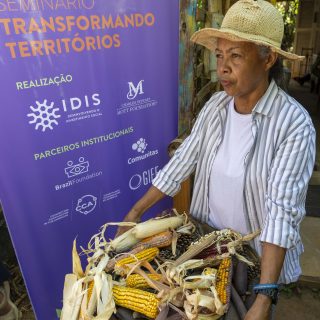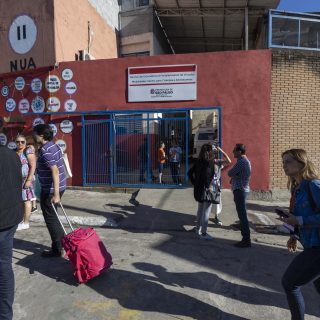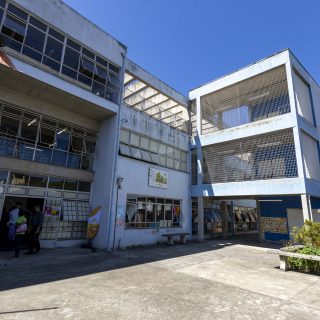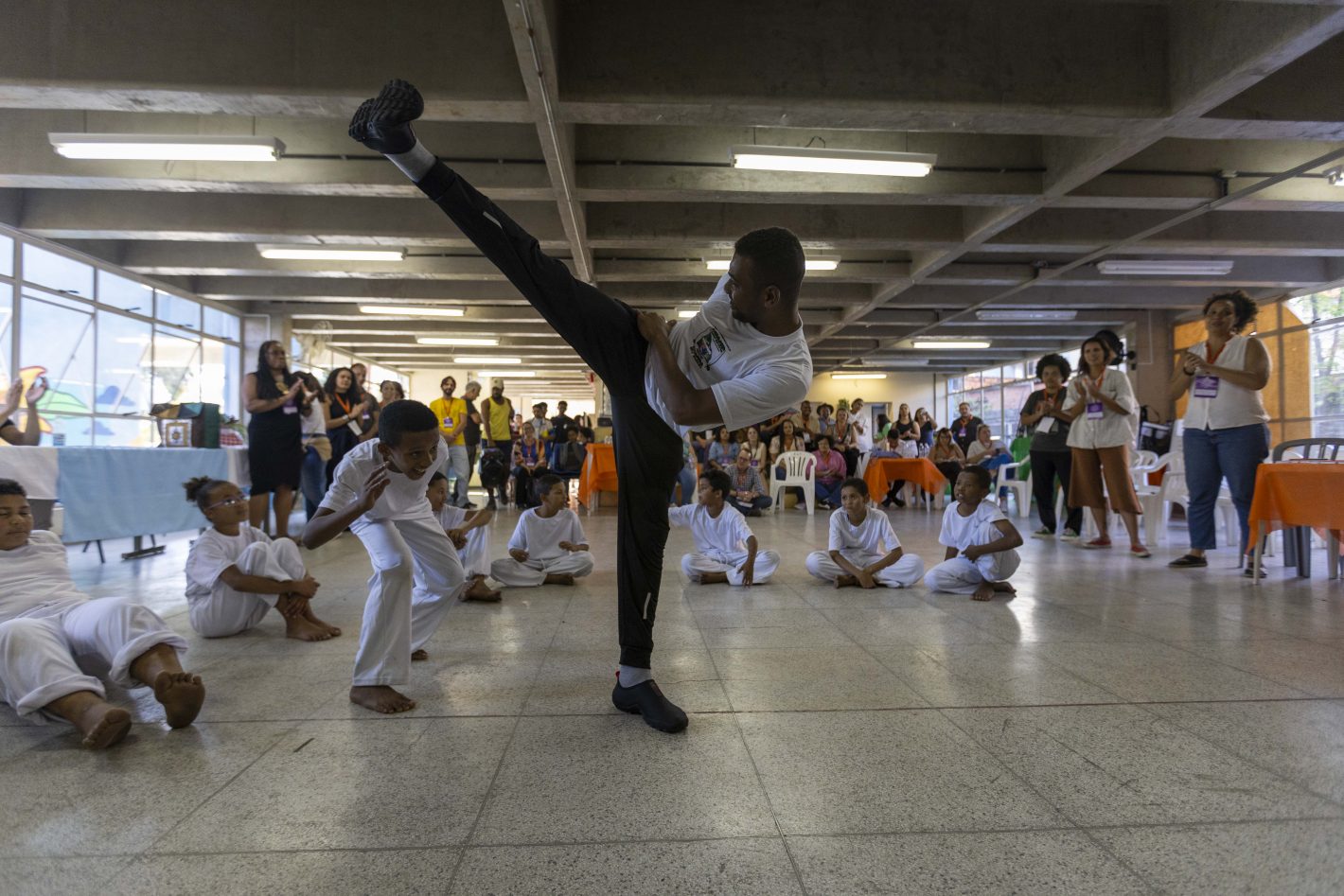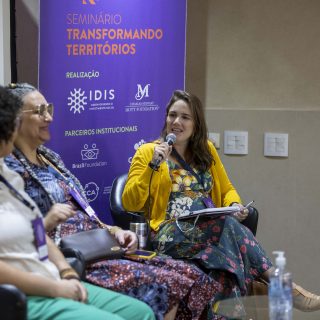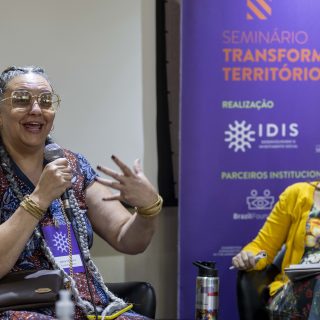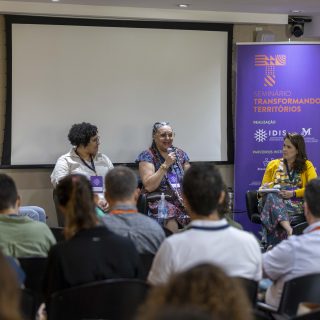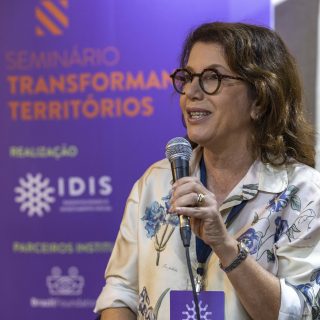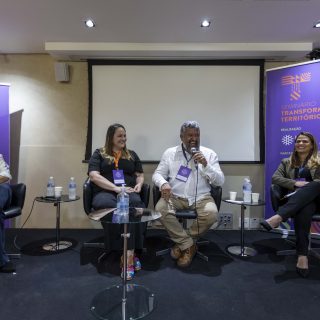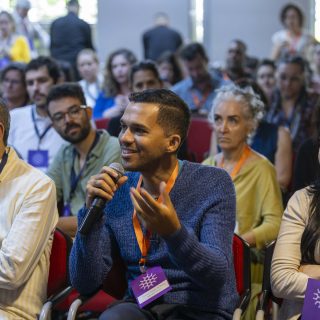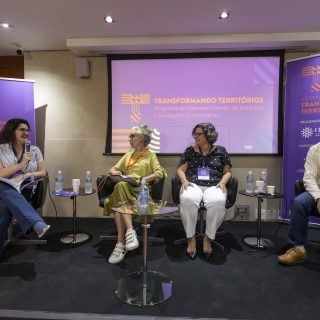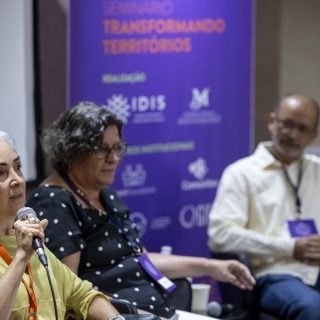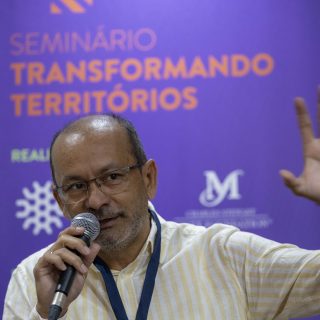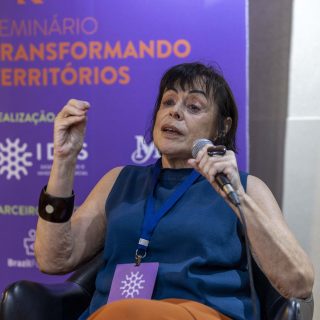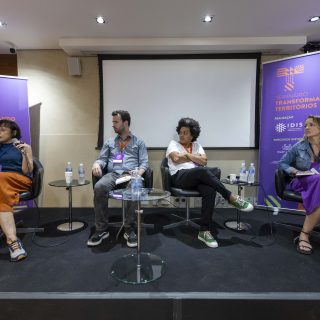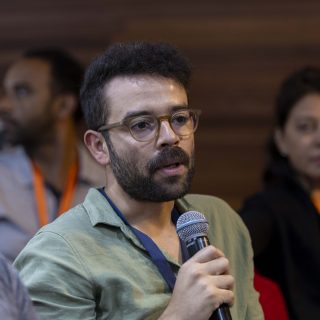The Transforming Territories Seminar, held in September at São Paulo, aimed to foster peer learning among representatives of Community Foundations (CFs) that are participants of the Transforming Territories Program, an impact project conducted by IDIS in partnership with the C.S. Mott Foundation. With visits to supported projects, lectures, and training sessions, the seminar provided an opportunity to deepen the understanding of a fundamental theme: the transformative power of these organizations in Brazil. The meeting also included the participation of the Brazilian Philanthropy Forum.
In its second edition, the event had the participation of over 60 individuals, including leaders of CFs, philanthropists, partners, and supporters committed to the cause.
“The three days were important for connections, benchmarking, and expanding perspectives, processes, and possibilities”, summarized one of the participants.
“The Seminar was very special, especially because it was highly interactive. I believe in this collective construction for Transforming Territories for the coming years”, commented another participant anonymously in the event evaluations.
Inspiration and Example: A Visit to Cacimba Institute
It is not possible to visit São Miguel Paulista, a periferic neighborhood on the east of the city of São Paulo, and don´t notice the impact of the projects supported by Cacimba Institute. The organization has been part of Transforming Territories program since 2020, and can be considered one of the pioneer CFs at São Paulo. Cacimba was established with the support of the program and built on the solid trust that community leader Hermes de Souza had in the region. Since then, Souza has been at the helm of the Institute. Emphasizing the importance of inspiring action, the visit marked the opening of the seminar.
Throughout the day, social projects supported by Cacimba in the region were showcased. Many of them received guidance from leader Hermes de Souza and are now supported by the Institute.
- The breakfast, lunch, and afternoon coffee were served by local projects: “Mulheres do Gau (Women from Gau)” and “Escola de Gastronomia (Gatronomy School)”. Their food is organic and locally produced by women from the region.
- Visit to the building of the New Union of Art Institute – NUA, which houses several youth-led social projects. Among them are: Nuar Radio and TV, Debaixo da Ponte School, and the New Union Children and Adolescents Center.
- Next, a visit was made to the “Flor de Cabruêra” project, a workshop composed of women from the community. They create various products (backpacks, pencil cases, bags, etc.) on-demand, always using recyclable materials.
- Finally, a visit was made to the “Unidiversity of the Periphery.” The space hosts various courses in arts, computer science, and even sewing. Through these projects, the aim is to facilitate the exchange of experiences and practical learning that encompasses social and environmental issues.
Learning and Training: a constant
In the afternoon, the group took part in the “Diversity and Human Rights” workshop, offered by Clara Serva, partner in the Business and Human Rights department of the law firm TozziniFreire, and Maria Paula Bonifácio Custódio, a lawyer in the same department.
Between the moments of sharing experiences and breaks, there were cultural dance performances by projects from the NUA Institute, led by local individuals.
On the second day of the Seminar, lectures and discussions highlighted the relevance and actions of CFs in their territories, and many experiences were shared. The meeting took place at the Comunitas headquarters, which provides institutional support to Transforming Territories.
Here are the highlights from the four panels that were part of the event.
Panel 1: GREAT IMPACT FROM SMALL DONATIONS: ENHANCING CHANGE WITH SIGNIFICANT CONTRIBUTIONS
This panel featured speakers Elio Raymundo (President of the Network of Good Organizations), Thais Almeida (Executive Secretary of the Espraiada Institute), Alânia Cerqueira (Leader of the M’Boi Community Fund), and moderation by Pâmela Ribeiro (Coordinator of Special Projects at GIFE).
The panel brought new perspectives on how supporting small local initiatives can generate significant social and environmental transformations, highlighting the potential of funds dedicated to micro-projects and seed capital for community strengthening, especially in regions where resources are concentrated in large organizations.
Elio Raymundo, President of the Network of Good, which operates in the metropolitan region of Rio de Janeiro, emphasized how projects that receive small financial support can achieve “unexpected results” in local development. However, he stressed that this is only possible through trust in organizations and leaders who are change makers in their territorie.
Panel 2: STRENGTHENING BONDS: BUILDING SUSTAINABLES RELATIONSHIPS WITH THE TERRITORY
This panel featured speakers Hermes de Sousa (Director of the Cacimba Institute), Ana Paolo Vieira (Council Member of FUNDAES), Flávia Mota (President of the JEQUI Community Fund), and was moderated by Lúcia Dellagnelo (Ambassador of the Transforming Territories Program).
Starting from the need to create bonds, Hermes brought the issue of trust to the discussion to strengthen partnerships and build with the community. According to him, “self-trust leads to trust in others,” and this establishes the regeneration of trust. The key to sustainable relationships, based on his experience, is “engaging and working with the community, not for the community.” To achieve this goal, it is necessary to speak the same language and adapt the language in each space, even in the construction of calls for proposals, which the Cacimba Institute has made more inclusive by allowing submissions through videos and audio in addition to written formats.
Panel 3: UNITING FORCES: COLLABORATING WITH THE PUBLIC SECTOR AND BUSINESSES FOR COMMUNITY TRANSFORMATION
This panel featured speakers Eliane Macari (President of FEAV), Jair Resende (Superintendent at the FEAC Foundation), Célia Petit (President of the Manauara Association), and was moderated by Patrícia Loyola (Director of Social Investment and Management at Comunitas).
The partnership between foundations dedicated to neighboring cities – FEAV and FEAC for Valinhos and Campinas, respectively – also demonstrated the strength of collaboration in their areas of operation. As Jair Resende of FEAC shared, with more than 60 years of history, FEAC continues its mission to stimulate the social sector and has been supporting the development of FEAV by donating a century-old property to establish FEAV’s endowment fund. Mutual support is an example to be followed and demonstrates the power of community transformation in this territory.
Panel 4: UNITING FORCES: COMMUNITY PHILANTHROPY FOR SOCIAL JUSTICE
This panel featured speakers Diane Pereira (President of the Baixada Maranhense Community Institute), Gisele Ribeiro (President of the Redes da Maré Association), Willian Narzetti (Executive Manager of ICOM), and was moderated by Mônica de Roure (Vice President and Director of Institutional Relations at BrazilFoundation).
Regarding potential, Diane emphasized the need to be within the territory so that community philanthropy can understand the possibilities, people, and the land of a region in different situations. She believes that “considering there is potential when the river is full because it’s good for watering the plants, and when it’s empty, it’s good for moving cattle to other regions. It is necessary to think that development is about seeing abundance, not scarcity.” The representative from the Baixada Institute also stated that a network of people is needed not only to understand abundance but also to materialize social change.
On the third and final day, participants had the opportunity to take part in the Brazilian Philanthropy Forum 2023. Learn more here.
Text produced by Alexandra Teles, Ana Beatriz Pedreira, and Leticia dos Santos, all from the IDIS team.
About Transforming Territories
The Transforming Territories Program is an initiative of IDIS – the Institute for the Development of Social Investment – in partnership with the Charles Stewart Mott Foundation, with a mission to promote the creation and strengthening of Community Foundations and Institutes in Brazil, with the engagement of donors and civil society, knowledge sharing, and technical support. BrazilFoundation and GIFE are institutional partners.
Community Foundations and Institutes have become an important institutional arrangement for social development and addressing the various demands of territories, whether they are neighborhoods, cities, or regions, with a long-term vision and seeking systemic impact for the development of the region. They play a central role in connecting social organizations and initiatives with donors, civil society, and the government, promoting transparency and engagement. These organizations act as grantmakers, financing projects and social initiatives in multiple causes to address the demands and priorities of the region, and they strengthen the third sector in the region through capacity building and technical support, invest in knowledge production, and promote a culture of giving in the territory where they operate.
Currently, the Transforming Territories Program consists of 17 community foundations and institutes from various regions of Brazil, located in 10 states.

